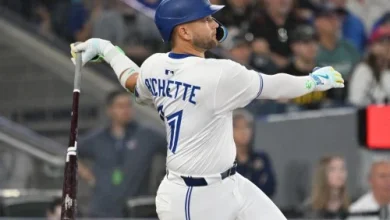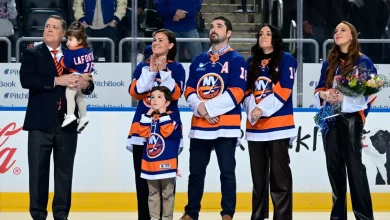F1 roundtable: Will the Apple TV deal harm casual fan interest in America? – The Athletic

The news that Apple TV will take over Formula One broadcast rights in the United States from 2026 dominated the news cycle on the opening day of track action at the 2025 U.S. Grand Prix in Austin. Almost as if it were by design.
We gathered The Athletic’s F1 experts Luke Smith and Madeline Coleman, along with our senior sports media columnist Andrew Marchand, and had them answer many of the burning questions F1 fans across America have been asking about this deal.
Here’s how they responded:
What’s the vibe from F1 fans you’ve all talked to? Are they willing to pay for another streaming service to follow F1, or is this where casual supporters drop off?
Marchand: My gut is that some casual fans will drop off. The paid streaming services are closed gardens, so you have to have a big desire to see something. I’m not sure casual fans will transfer to Apple if they don’t already have it.
Coleman: I agree that casual fans likely will drop off at the start, at least based on our X mentions after the news broke Friday morning. As one person pointed out, they are already paying for cable, where there’s easy access to numerous sports. So why add another subscription service?
Smith: Judging by social media (so take that as you will), there is definitely an air of skepticism over the switch. Because yes, it is another streaming service subscription. If you were a casual F1 fan who only followed the sport through ESPN, then I can appreciate the frustration. But for fans who were already subscribed to F1 TV, if they can get the same service through Apple for less money and with all the added content, then it could work out. But it will definitely reduce the chance of people simply stumbling across F1 on TV, which was my personal gateway into the sport as a kid 20 years ago.
ESPN took F1 to over a million average viewers. How much of that growth was ESPN’s doing versus ‘Drive to Survive,’ the racing itself or F1’s broader U.S. expansion?
Marchand: “Drive to Survive” did have an impact, but I think the way F1 has presented its races has had a far greater impact. It has made it compelling for more fans. The Netflix docuseries may have opened the door for some, but F1 did a very good job of making people want to stay week after week.
Coleman: While “Drive to Survive” is largely credited with the F1’s popularity boom in the U.S., it came down to a multitude of factors. There was the docuseries, plus the rise of content creation and F1’s broader expansion in the United States. I’d argue that the key was offering multiple entry points to the sport, many of which required no prior knowledge of F1, and people engaging with content in a new variety of ways. That said, ESPN took a bet on F1, and its investment did help grow the sport in the U.S.
Smith: It’s all a combination. If you look at the growth in TV figures, a lot of it did come in the years that followed DTS, especially when the sport returned after the start of the pandemic. The fact ESPN was so easily available and, unlike NBC, did not include adverts during the races certainly aided that growth. But I’d put more of it down to the wider focus F1 has placed on the U.S. market rather than the direct work of the broadcaster itself.
Three U.S. races. A Brad Pitt movie. Cadillac is joining the grid. Is this F1 cashing in at the peak of American interest, or leaving money on the table by moving from ESPN too soon?
Marchand: It is not hard to think F1 would prefer to be on ESPN. It’s just a greater distributor in sports than Apple. Apple has been on the fringes of sports, even as it is one of the most powerful companies in the world.
Coleman: After hearing from F1 CEO Stefano Domenicali and Liberty Media (F1’s commercial rights holder) CEO Derek Chang, I don’t think F1 is moving on from ESPN too soon and is cashing in. Media is evolving across the board, and as Chang said on Friday, “It’s also understanding the media landscape. And I think people who ask the question of reach, and what does this imply for reach and all that sort of stuff, have somewhat of an antiquated view of what reach is. It’s very much stuck in a traditional television sort of way. Nowadays, you think about reach in a much different fashion.”
Smith: It’s definitely cashing in. And why wouldn’t it? The analysts I spoke to earlier this year all said that the reported $90 million that ESPN was paying was low given F1’s boom and popularity, meaning an uptick was always likely. F1 clearly believes that going with Apple will give it a chance to reach American fans in more dynamic ways, rather than just through TV.
Red Bull’s Max Verstappen conducts an interview with ESPN at the 2025 Miami GP (Kym Illman/Getty Images)
Andrew, what does the MLS/Apple deal tell us about what F1 might be walking into here?
Marchand: There should be apprehension. There is no proof that the MLS/Apple deal has been good for MLS. MLS has sort of claimed it has, but no one has offered up any actual numbers to support that the Apple deal was a good one.
But, as in this case, the money Apple offered compared to what MLS could get elsewhere was much greater. So, I guess, by that metric, it has been good. In terms of momentum, I’d say MLS has not gotten as much traction from Lionel Messi joining as it could have if ESPN and Fox were more involved. (Some MLS game simulcasts are still occasionally on Fox.)
What does F1 lose by disappearing from ESPN’s highlights programs and bar TVs across America? And what does it gain by joining Apple’s ecosystem?
Marchand: ESPN is always going to reach more casual fans, who could become diehards. Apple can reach people – much of the world has iPhones — but a push notification is easier to ignore than the subconscious marketing of highlights.
Coleman: Essentially, it’s both losing and gaining different definitions of accessibility. The sport’s fanbase is growing younger, and you need to evolve to meet your audience. ESPN integrated F1 into its sports network and appeared to reach its typical audience, at least from an outside perspective as a college football fan. While I watch College GameDay on Saturdays (when it doesn’t clash with F1), I see the advertisements for races. Meanwhile, Apple can reach the everyday consumer with no niche market restrictions.
Smith: Domenicali said he wanted F1 to be discussed in America in the same way that the NFL, NBA and MLB all are. But being on ESPN gave it that kind of resonance. It was in the same universe as those leagues, even if that did mean it had to fight for airspace. Joining Apple takes away that ease of people finding F1 when following a major sporting event; the 2024 Miami GP set F1’s TV viewership record thanks to the grand prix following a Game 7 NBA match-up. But the deal certainly adds an element of ‘cool’ to working with such a big, wide-reaching company.
Could Apple’s technology actually improve broadcasts in ways that justify the paywall?
Marchand: Doubt it.
Coleman: I’ll be optimistic and say possibly.
Smith: I’m curious how much F1 pursues this with Apple, given it was such a big point of promotion around the summer movie, which used Apple camera technology for filming. But if this does lead to an improvement in broadcast quality, then it would end up benefiting all the F1 broadcasters, not just Apple, given the sport is shown with one “world feed.”
What defined the ESPN era for you? And what does F1 need the Apple era to be?
Marchand: The sport’s growth was just evident in the ESPN era. In theory, that is what the Apple era will bring, but, with truth serum, I’d bet the F1 leaders would have preferred to continue the ESPN era as opposed to gambling on Apple.
Coleman: I grew up watching ESPN and currently pay so I can continue watching its sports programming. When I look back on this era, I think of ‘what if.’ What if ESPN fully bought into F1 and pulled out the stops like it does for NFL or college football, even to a lesser extent, rather than airing Sky Sports’ feed? I see the work they’re doing behind the scenes at the U.S. races, and I still wonder about what could have been. Apple essentially needs to do what ESPN didn’t and put its full weight behind it.
Smith: You’re talking to a guy who lost his first job in F1 (with NBC) when ESPN got the rights at the end of 2017! All jokes aside, a lot of credit has to go to ESPN. Even if it didn’t put its full might behind F1, taking the Sky broadcast feed and mainly doing its own on-site content only at the American races, its support and availability have definitely been a big plus. With Apple, F1 needs to really double down on being everywhere in America through this partnership. Striking that balance without it feeling suffocating will be the challenge.





